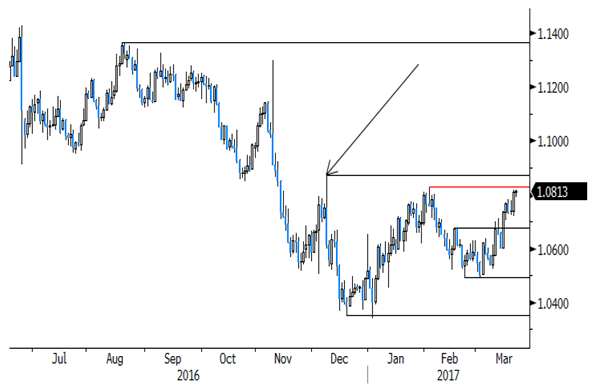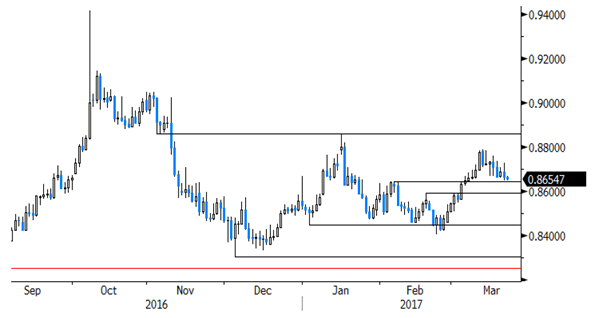Sunrise Market Commentary
- Rates: Core bonds profit as (US) equity markets and oil prices took a hit
US equities corrected more than 1% lower yesterday with main indices closing below the neckline of a minor double top formation, suggesting that the down-leg isn’t over yet. Simultaneously, oil prices took a hit. Especially US Treasuries profited from a safe haven bid. Today’s eco calendar is empty, suggesting more (risk) sentiment-driven trading. - Currencies: Dollar tests key support as reflation trade falters
A risk-off correction triggered a further decline in US yields and pushed the dollar to key support levels. Especially USD/JPY is vulnerable if the risk-off trade continues. EUR/USD nears 1.0829/74 resistance. However, the EUR/USD rally might slow as we don’t expect the US/German interest rate differential to widen further in case of a real risk-off move.
The Sunrise Headlines
- US equities were heavily hit by profit taking after Nasdaq hit new all-time highs amid belief that Trump’s pro-growth policies won’t sail through Congress. Banks led the rout as US Treasury yields fell, while the dollar continued its retreat. Asian equities follow WS down the drain this morning.
- Centrist Macron’s bid for power in France gathered pace when he won support from a junior minister in the Socialist government while the interior minister resigned amid scandal in a new twist to the topsy-turvy presidential campaign.
- BoJ board members rejected suggestions the central bank should raise its 10-yr government bond yield target to match expected gains in Treasury yields, Minutes of their January monetary policy meeting showed
- Cleveland Fed Mester said she’s built ‘a bit more’ than 3 interest rate increases into her forecast and expects the US to expand at a faster rate than the 2% target this year. Voting member Dallas Fed Kaplan pencils in 3 hikes.
- Portugal extended the maturities on state loans to its bank resolution fund by nearly three decades to 2046 to avoid imposing extra costs on a fragile banking sector as the state looks set to sell rescued bank Novo Banco at a loss to be borne by banks.
- Banks in London that relocate operations to the euro zone after Brexit are likely to be spared a lengthy entry test by regulators, making it easier for them to shift, according to two officials with knowledge of the matter.
- Today’s eco calendar remains extremely thin with only US existing home sales. After European trading, the Reserve Bank of New Zealand is expected to hold its policy rate unchanged at 1.75%.
Currencies: Dollar Tests Key Support As Reflation Trade Falters
Key USD support area under heavy strain
On Tuesday, the euro initially profited as polls showed a receding chance of a Le Pen victory in the French Presidential election. Later, dollar softness returned as investors took profit on ‘the US reflation trade’. Equities fell prey to intraday profit taking and interest rate differentials between the US and Europe/Germany narrowed further., both for shorter (2yr) and longer (10 yr) maturities. The trade-weighted dollar dropped below the psychological barrier of 100. USD/JPY tested the 111.60 supported and close the session at 111.71. EUR/USD finally stabilized in the low 1.08 area and close the session at 1.0811. The first resistance at 1.0829 came within reach but was left intact for now.
Overnight, Asian equities joined the risk-off correction from the US, with Japanese equities hit the hardest as USD/JPY is testing the key 111.60/36 support area. The correction on the reflation trade also weighs on industrial commodities and commodity related assets (despite the decline of the dollar). The Aussie dollar is losing ground against an overall weak dollar. AUD/USD off the recent highs north of 0.77 and trades currently in the 0.7660 area. EUR/USD is holding within near the recent highs (1.0810).
Today, the only economic data release of importance is the February US Existing Home sales. The market expects a 5.56M annual rate of sales, down 2.4% M/M from January, which was the highest level in about 10 years. We put the risks for the outcome on the downside of consensus. Aside from the data, we keep an eye on the comments from central bankers on the recent developments.
In day-to-day perspective, the key question is whether the correction on the reflation trade continues. We assume that, after this first shock, some market nervousness might persist, especially as long as there is no concrete, additional news on US (fiscal) policy. Last week, US bond sentiment was already positive after the Fed policy decision. This decline in US yields might have some further to go and weigh on the dollar. USD/JPY looks most vulnerable. A sustained break of the 111.36/60 support might have consequences for the overall USD sentiment. Over the previous days, the big change was the sharp narrowing of the USGerman 2- and 10-year yield spread. If markets were to move to a more protracted risk-off correction, the decline of US and German yields might again be more in line.
Interest rate differentials shouldn’t narrow that much further. In an overall risk-off context, EUR/USD might remain rather well bid but we don’t see a strong case for a big outperformance of the euro against the dollar. So, a test of the 1.0829/74 resistance is very well possible, but the EUR/USD rebound might slow from here. Even so, in a day-to-day perspective, there is no reason to try the catch the falling (USD) knife already now. In a longer term perspective, we don’t change our USD-constructive bias based on the eco fundamentals. However, this doesn’t tell anything on the short-term momentum/trading dynamics

EUR/USD holding near the key 1.0829/74 resistance
EUR/GBP
Higher UK inflation puts a solid floor for sterling
The euro initially rallied yesterday as polls showed that Macron took the lead in the (1st round of the) presidential race. EUR/GBP filled offers in the 0.8725 area. However, mid-morning, the focus turned to the UK inflation. CPI inflation jumped to 2.3% Y/Y, well above the BoE’s inflation target. Core inflation (2.0% Y/Y) was also well above consensus. Last week, some BoE members warned that they considered a rate hike if inflation (or growth) accelerates. UK yields and sterling jumped higher. EUR/GBP dropped to the 0.8655 area. Later in the session, EUR/USD and cable basically traded in line as a risk-off correction started on US stock markets. EUR/GBP closed the session at 0.8663 (from 0.8690). Cable finished the day at 1.2478 from 1.2358, mirroring both sterling strength and US weakness.
Today, there are no important eco data in the UK. So, sterling trading will be driven by overall market trends/risk sentiment. Of late, a risk-off context often hurt sterling more than the euro. However, with markets pondering the chances on a UK rate hike after yesterday’s high UK inflation data, the balance between the euro and sterling might remain in place as long as there are no new (negative) headlines on Brexit.
Last week, the sterling decline took a breather. Some time ago, EUR/GBP cleared 0.8592 resistance, improving the MT technical picture. However, yesterday’s (substantially) higher than expected UK inflation probably put a decent floor for sterling short-term. We change our short-term bias on EUR/GBP from positive to neutral. Some further consolidation in the 0.85/0.88 area might be on the cards. Longer term, Brexit complications remain a potential negative for sterling, but this issue isn’t in the spotlights right now.

EUR/GBP: Higher than expected UK inflation puts a floor for sterling
